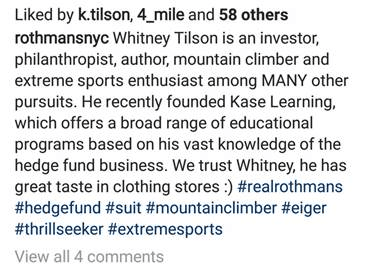Whitney Tilson on 3 programs in NYC next week; free webinar on Monday; interview with TheStreet.com; shorting conference video and next one September 24; What the Hell Happened at GE?; Theranos’ Dysfunctional Corporate Culture; device repair; Rothman’s clothing.
Q1 hedge fund letters, conference, scoops etc, Also read Lear Capital: Financial Products You Should Avoid?
1) We’re teaching our three programs in NYC next week (a new one-day program, an Advanced Seminar on Short Selling on Tuesday, followed by a three-day Lessons from the Trenches investing bootcamp Wed.-Fri., and a one-day seminar on How to Launch and Build an Investment Fund on Saturday. We typically fill our last few seats at a steep discount for young/emerging investors, so if you’re available on short notice please email me and we’ll try to accommodate you.
VW readers can use VW10 for a big discount
2) I thought we’d be lucky to get 50 people for our free webinar on Monday, but we’re at 200 registrations and counting! Here are the details if you wish to join:
Via our new business, Kase Learning, my long-time partner Glenn Tongue and I are teaching value investing and investment entrepreneurship to the next generation of investors. Our programs are primarily aimed at experienced investors and are highly personalized, so they aren’t cheap (up to $2,500/day), but just for fun we’re teaching a free two-hour seminar for beginners, An Introduction to Value Investing, this coming Monday, June 11 from 5:00-7:00 p.m. New York time.
VW readers can use VW10 for a big discount
For the first time, we will be teaching via an online webinar so anyone, anywhere in the world can participate. To register, click here. (We will also record it and post it publicly afterward.)
During the seminar we will cover various topics including: the definition of value investing, intrinsic value, margin of safety, three ways to beat the market, the three steps to evaluating stocks, valuation techniques, traits of successful investors, and how to develop an edge. We’ll also share our analysis of two of our current favorite stocks, Berkshire Hathaway and Google, and leave plenty of time for Q&A as well.
I hope you can join us!
3) I did a video interview with TheStreet.com this week – here are the clips/articles they’ve posted:
- Why Elon Musk's Erratic Behavior Has Put Tesla's Future at Risk
- Alphabet Is a Near Monopoly and Profits Are Exploding So Buy the Stock
- Warren Buffett Betting That Apple Is Worth $2 Trillion
- Warren Buffett at Age 87 Still Does One Amazing Thing That Drives Success
4) I’ve just posted a brief three-minute video of highlights from last month’s conference on short selling here. 12 of the speakers from the conference gave us permission to post the PDFs of their presentations, which you can access here.
We have scheduled our next short selling conference on Monday, Sept. 24, so please put this in your calendar. It will be in the same venue, the NYAC, with a similar format, but with an even greater emphasis on actionable ideas and 20-minute speaking slots to allow for a few questions after each presentation. I will send you the registration link when it’s ready, along with a special discount code only for those who joined us earlier this month.
5) Fortune with an in-depth (and, from what my sources tell me, spot-on) look at What the Hell Happened at GE?, http://fortune.com/longform/ge-decline-what-the-hell-happened. Excerpt:
Few corporate meltdowns have been as swift and dramatic as General Electric’s over the past 18 months—but the problems started long before that.
…As economies boomed worldwide and U.S. stock indexes soared, GE has collapsed in a meltdown that has destroyed well over $100 billion of shareholder wealth. Pounded by a nonstop barrage of bad news, investors are traumatized and disoriented. “They just can’t figure it out and don’t want to invest,” says analyst Nicholas Heymann of William Blair & Co. “This isn’t like surveying the landscape. It’s spelunking with no lights and no manual.” Analyst Scott Davis of Melius Research says some investors have become permanently disillusioned: “Many have told us they will never own GE again.”
Retirees and employees who bought heavily into the stock are furious; some picketed GE’s annual meeting in April. Former executives are dumbfounded. “It’s unfathomable,” says one. “You couldn’t possibly dream this up. It’s crazy.” After all, this is GE, a corporate aristocrat, an original Dow component, the world’s most celebrated management academy, now revealed as a financial quagmire with a deeply uncertain future. Its bonds, rated triple-A when Immelt became chief, are now rated five tiers lower at A2 and trade at prices more consistent with a Baa rating, one notch above junk.
In response to this debacle, GE has repudiated its previous leadership with a zeal unprecedented in a company of its size and stature. Gone in the past 10 months are the CEO, the CFO (who was also a vice chair), two of the three other vice chairs, the head of the largest business, various other executives—and half the board of directors. The radical board shake-up “could be one of the most seminal events in the history of U.S. corporate governance,” says a longtime vendor and close student of GE.
This reminds me of what I sent around on March 30:
There have been rumors that Buffett might be either buying GE stock or could buy a division of GE in a privately negotiated transaction. I don’t think either is likely (though neither is impossible – I’d put odds at 10-20%).
Regarding buying the stock, take a look at this chart of GE’s EBITDA, operating income and free cash flow (operating cash flow minus cap ex) – all three had been trending down from 2012-16 and then fell off a cliff in 2017:
It’s hard for me to see Buffett (or Weschler or Combs) buying GE stock when it’s almost impossible to figure out what true, normalized free cash flow is.
As for buying a division of GE, I’m sure Buffett would be delighted to buy certain assets at the right price, but I don’t think GE is a seller – and if they were, they would likely conduct a big auction to get the highest price, which isn’t the kind of thing Buffett usually participates in, much less wins.
He’s typically a buyer when one or more of the following conditions are present:
a) The seller needs money fast (e.g., lots of deals in the financial crisis);
b) The seller really cares about who the buyer is (they want Buffett’s stamp of approval (e.g., GS and GE in the financial crisis) or they care about a good permanent home for the business, where there will be minimal interference (e.g., Iscar)); or
c) The seller is sick of being a public company (e.g., Precision Castparts).
None of these is true in the case of GE.
6) John Carreyrou of the WSJ has done extraordinary reporting to reveal the scam that is Theranos. Here’s an excerpt from his new book, BAD BLOOD: Secrets and Lies in a Silicon Valley Startup from this article in Wired magazine, A New Look Inside Theranos’ Dysfunctional Corporate Culture, www.wired.com/story/a-new-look-inside-theranos-dysfunctional-corporate-culture. Excerpt:
At the time, Theranos was on the cusp of becoming a tech darling. Founded by the charismatic Stanford dropout in 2003, its promises to revolutionize blood-testing—and by extension, the vast industry of medical diagnostics—would be swallowed whole by most of the technology press, which would lavish Holmes with glowing coverage. (WIRED was not exempt). Only later—in October 2015—would the truth come out: Theranos was a fraud built on secrecy, deliberate fabrication, and hype. After I revealed that fraud, the company would begin an implosion that continues to this day.
Here’s another article Carreyrou wrote in the WSJ last month, Theranos Inc.’s Partners in Blood, www.wsj.com/articles/theranos-inc-s-partners-in-blood-1526662047. Excerpt:
Theranos Inc.’s 15-year quest to revolutionize the blood-testing industry met with the latest in a series of crippling blows in March when the Securities and Exchange Commission charged the Silicon Valley diagnostics firm with conducting an “elaborate, years-long fraud.” The SEC accused the firm of deceiving investors into believing that its portable device could perform a broad range of laboratory tests on drops of blood pricked from a finger, when in fact it was doing most of its tests on commercial analyzers made by others.
Much of the attention has focused on Theranos founder Elizabeth Holmes. But another character played a central role behind the scenes in the alleged fraud: Ms. Holmes’s boyfriend, Ramesh “Sunny” Balwani, according to more than three dozen former Theranos employees who interacted with Mr. Balwani extensively over a number of years. Mr. Balwani, who met Ms. Holmes when she was a teenager, jointly ran the company with her for seven years as president and chief operating officer and enforced a corporate culture of secrecy and fear until his departure in the spring of 2016, the former employees say.
7) Two random recommendations based on my own experiences this week:
A) Every few months, I need to have one of my (or my family’s) many electronic devices fixed: someone cracks their phone screen or drops it in water, a key on my laptop keyboard stops working, etc. There are a lot of shady repair places that will rip you off, so thank goodness I found Abraham at icanfixitforyou.com a few years ago – he’s a total stand-up guy and can fix ANY problem with ANY device (I have yet to stump him). He has a few locations in NYC (the one I go to is in the MetLife Building right above Grand Central at 200 Park Ave., Suite 1796) or you can mail your device to him and he’ll fix it and send it back. Just email him at [email protected] and use my name.
B) My good buddy Jim Giddon posted the photo below on Instagram yesterday (it accompanied the interview I did in Crain’s New York Business recently: Ex-hedge fund founder teaches aspiring money managers where he went wrong, crainsnewyork.com/article/20180530/FEATURES/180529914/ex-hedge-fund-founder-teaches-aspiring-money-managers-where-he-went).
In the photo, I'm wearing a suit I bought at Rothman’s, the largest independent men’s clothing store in NYC, of which Jim is the third-generation owner (it's at 222 Park Ave South at 18th St.; also a store in Scarsdale; www.rothmansny.com).
I used to buy most of my clothes at Costco but I now realize that I was being a stupid cheapskate. In any professional environment, appearances matter (perhaps they shouldn't, but I assure you that they do), and clothing is a key part of anyone's appearance. You don't want to look stale and out of touch, especially when you're an old geezer like me.
Once I (finally!) realized this, I started doing all of my shopping for professional clothes at Rothman's because I don't know diddly (or care) about clothes/fashion/style. As Buffett says, "if you don't know jewelry, know your jeweler." Ditto for clothes. So, once or twice a year, I call up Jim and come visit for an hour and he refreshes my wardrobe.
If you want Jim to take care of you as well, call him at 212-777-7400 or email him at [email protected], tell him you're a friend of mine, and he’ll give you the same 20% off he gives me.
Sample price points: suits start at $500, but $1,800 for really nice ones; ~$400 for a blazer, $100-200 for shirts and pants. As a value guy, it kills me to pay prices like this, but I now know that it's money well spent (and I still buy all of my non-professional clothes at Costco)!
PS--I buy all of my ties at Seigo (http://seigoneckwear.blogspot.com; 1248 Madison Avenue at 90th St.) – super high quality, made in Japan, and only ~$80.







